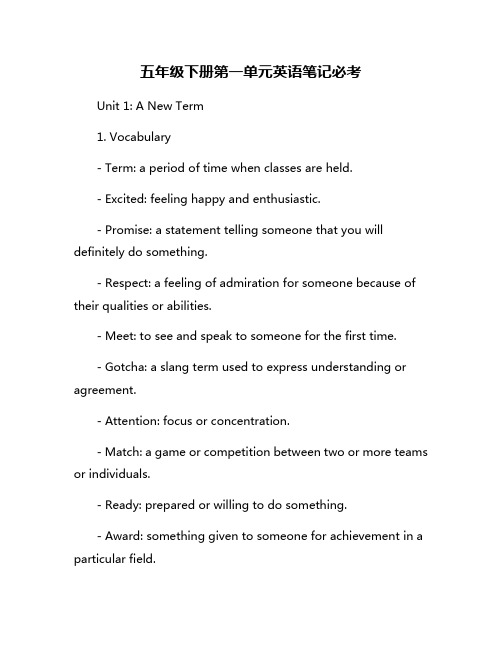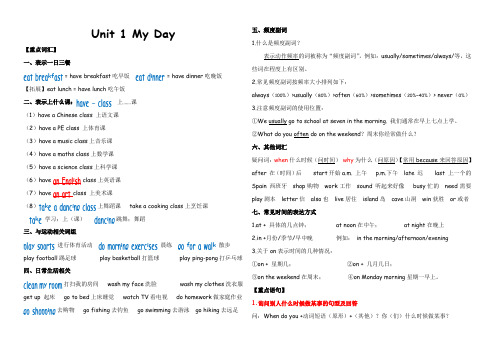五年级英语下册第一单元知识点汇总
Unit1Myday(讲义)-人教PEP版英语五年级下册(1)

PEP英语五年级下册Unit 1 知识梳理【单元语音归纳】一、单词:eat breakfast[ˈbrekfəst]吃早餐 a.m上午have···class 上···课p.m 下午play sports 进行体育运动why 为什么exercise[ˈeksəsaɪz]活动;运动。
shop 去买东西;购物do morning exercises做早操work[wɜ:k] 工作eat dinner吃晚饭last [lɑ:st]上一个的;刚过去的clean my room 打扫我的房间sound[saʊnd] 听起来好像go for a walk 散步also[ˈɔ:lsəʊ] 还;也go shopping 去买东西;购物busy[ˈbɪzi] 忙的take学习;上(课)need[ni:d] 需要dancing[ˈdɑ:nsɪŋ] 舞蹈play 戏剧;剧本take a dancing class 上舞蹈课letter[ˈletə(r)] 信when 什么时候live[lɪv] 居住after 在(时间)后island[ˈaɪlənd] 岛start 开始always[ˈɔ:lweɪz] 总是;一直usually[ˈju:ʒuəli] 通常地cave[keɪv] 山洞Spain[speɪn] 西班牙go swimming 去游泳late[leɪt] 晚;迟win[wɪn] 获胜二、词语1. eat breakfast 吃早饭2. have…class 上……课3. play sports 进行体育活动4. exercise活动;运动5. do morning exercises 做早操6. eat dinner 吃晚饭7. clean my room 打扫我的房间8. go for a walk散步9. go shopping 去买东西;购物10. take 学习;上(课)11. dancing 跳舞;舞蹈12. take a dancing class 上舞蹈课13. go swimming去游泳【重点句型再现】1. 询问对方什么时间做某事的句型及答语—When do you finish class in the morning? 你们上午的课几点结束?—We finish class at 1 o’clock. 我们一点钟结束上午的课。
PEP五年级英语下册Unit1-6重点知识小结

Unit 1 This Is My Daydo morning exercises晨练eat breakfast吃早饭have english class上英语课play sports进行体育运动eat dinner吃晚饭when什么时候evening夜晚;晚上get up起床at在……点钟usually通常;一般noon中午climb mountains爬山go shopping购物;买东西play the piano弹钢琴visit grandparents看望祖父母go hiking去远足weekend周末often经常sometimes有时候话题1:日常生活时态:一般现在时1.When do you do morning exercises? 你什么时候做早操?I usually do morning exercises at 8:00. 我经常八点钟做早操。
(I usually get up at 12:00 at noon . 我经常在中午十二点起床。
) 2.When do you eat dinner ? 你什么时候吃晚餐?I eat dinner at 7:00 in the evening. 我在晚上七点种吃晚餐。
3.When is the best time to go to Beijing? Fall. 最好在什么时候去北京?秋天。
Unit 2 My Favourite Seasonspring春天summer夏天fall秋天winter冬天season季节which哪一个best最;极swim游泳fly kites放风筝skate滑冰make a snowman堆雪人plant trees种树why为什么because因为sleep 睡觉话题2:季节时态:一般现在时1.Which season do you like best ? I like spring best.(Spring.)你最喜欢是什么季节?我最喜欢春季。
小学英语五年级下册第一单元知识总结

重点单词1.动词:run, jump, sing, dance, sit, stand, see, look,draw, cry,talk,sleep2.名词:boy, girl, picture, woman, baby, man,water,tea,candy3.形容词:hungry4.副词:down, up, now5.代词:who重点句型祈使句:肯定句:动词原形开头,please更委婉,please可在句子前,句子后。
否定句:在动词原形前面+don't。
1.P lease don't run. 请不要跑。
2.D on't run, please.请不要跑。
3.W alk, please. 请慢走。
4.P lease walk.请慢走。
现在进行时:be (am/ is/are)+动词ing动词ing的变化:1.以重读闭音节结尾,即“辅+元+辅”结尾的动词,先双写末尾的辅音字母,再加-ing。
如:run--run ning swim--swim ming sit--sit ting2.以一个字母-e结尾的单词,去掉字母-e,再加-ing,但是双写-ee 结尾的,要直接加-ing。
如:dance--danc ing make--mak ing have--hav ing3.一般情况下,在动词词尾直接加-ing,如:fly--fly ing cry--cry ing play--play ing draw--draw ing sing--sing ing read--read ing wash--wash ing look--look ing jump--jump ing talk--talk ing例句:1. Jenny is looking out of the window.詹妮正在向窗外看。
2. I am drawing a picture. 我正在画画。
3.They're having fun.他们正玩的开心。
五年级下册第一单元英语笔记必考

五年级下册第一单元英语笔记必考Unit 1: A New Term1. Vocabulary- Term: a period of time when classes are held.- Excited: feeling happy and enthusiastic.- Promise: a statement telling someone that you will definitely do something.- Respect: a feeling of admiration for someone because of their qualities or abilities.- Meet: to see and speak to someone for the first time.- Gotcha: a slang term used to express understanding or agreement.- Attention: focus or concentration.- Match: a game or competition between two or more teams or individuals.- Ready: prepared or willing to do something.- Award: something given to someone for achievement in a particular field.- Fantastic: very good or impressive.2. Grammar- Present simple tense: used to talk about habits, routines, and facts.E.g. He goes to school every day.- Present continuous tense: used to talk about actions happening at the moment of speaking.E.g. She is reading a book.- Future structures: will + base verb, going to + base verb, present continuous tense.E.g. I will meet you after school.- Comparative adjectives: used to compare two things.E.g. My notebook is bigger than yours.- Superlative adjectives: used to compare three or more things.E.g. She is the tallest girl in the class.3. Speaking Practice- Role-play: students can pretend to be characters in a dialogue and practice speaking.E.g. A: Hi, I'm Anna, what's your name?B: Hello Anna, I'm Jack.- Dialogues: students can read and practice dialogues with a partner to improve speaking skills.E.g. Teacher: What's your favorite subject?Student: My favorite subject is Math.4. Writing Practice- Keep a diary: students can write about their daily activities, thoughts, and feelings in a diary.E.g. Today I had a math test and I did my best.- Write a letter: students can practice writing formal or informal letters to friends, family, or pen pals.E.g. Dear Grandma, I hope you are doing well. I miss you a lot.5. Listening Practice- Listen to songs: students can listen to English songs and try to understand the lyrics.E.g. "We Will Rock You" by Queen.- Listen to podcasts: students can listen to podcasts in English about different topics to improve listening skills.E.g. TED Talks on science and technology.Overall, this unit focuses on vocabulary, grammar, speaking, writing, and listening practice to help students improve their English skills and prepare for the upcoming term. By studying and practicing these key concepts, students will be able to confidently communicate in English and succeed in their academic endeavors. Good luck!。
(完整版)人教版五年级英语下册Unit1知识点汇总

Unit1 My day 知识整理△话题:谈论每天的活动及时间安排△词汇:do morning exercises(做早操)eat breakfast/lunch/dinner(吃早餐/午餐/晚餐)have...class(上…课),play sports(做运动)clean my room(打扫我的房间),go for a walk (散步) go shopping(购物),take a dancing class(上舞蹈课)△拓展词汇:get up(起床), go to bed(上床睡觉)wash my clothes(洗我的衣服), watch TV(看电视)do homework(做作业), play music(演奏音乐)cook dinner(煮晚餐), at home(在家)in the morning(在上午),in the afternoon(在下午)in the evening(在晚上),at night(在半夜)△句型:①询问做某事在几点When do you+动词原形(短语)+其他?—— At +时间—— I(+频度副词)+动词原形(短语)+at+时间。
例句:When do you get up in the morning?—— At 7:30.—— I often get up at 7:30.②询问周末的活动安排What do you often do on the weekend?I often (always/sometime/usually) +…(周末的活动)+with … (某人)+on the weekend (on Saturdays/on Sundays ).例句:What do you do on the weekend ?I often take a dancing class with my friend on Sundays. △知识点:1:注意介词的搭配at +具体时间(几点)/night/home at 9 o ’clock in +国家/季节 in Spainon +星期 on the weekend/on Sundays with +人 with my father/mother/friend 2:表示时间频率词的区别always 表示总是,一直;usually 表示经常,通常;often 表示经常,常常;sometimes 表示有时,间或。
人教版PEP英语五年级下册Unit1 My Day知识点归纳与练习(含答案)

Unit 1 My Day【重点词汇】一、表示一日三餐eat breakfast = have breakfast吃早饭eat dinner= have dinner吃晚饭【拓展】eat lunch = have lunch吃午饭二、表示上什么课:have … class 上……课(1)have a Chinese class 上语文课(2)have a PE class 上体育课(3)have a music class上音乐课(4)have a maths class上数学课(5)have a science class上科学课(6)have an English class上英语课(7)have an art class 上美术课(8)take a dancing class上舞蹈课take a cooking class上烹饪课take学习;上(课)dancing跳舞;舞蹈三、与运动相关词组play sports进行体育活动do morning exercises晨练go for a walk散步play football踢足球play basketball打篮球play ping-pong打乒乓球四、日常生活相关clean my room打扫我的房间wash my face洗脸wash my clothes洗衣服get up 起床go to bed上床睡觉watch TV看电视do homework做家庭作业go shopping去购物go fishing去钓鱼go swimming去游泳go hiking去远足五、频度副词1.什么是频度副词?表示动作频率的词被称为“频度副词”,例如:usually/sometimes/always/等,这些词在程度上有区别。
2.常见频度副词按频率大小排列如下:always(100%)>usually(80%)>often(60%)>sometimes(20%~40%)> never(0%)3.注意频度副词的使用位置:①We usually go to school at seven in the morning. 我们通常在早上七点上学。
英语五年级下册笔记

英语五年级下册笔记一、单词部分。
1. Unit 1.- 四会单词(要求会听、说、读、写)- do morning exercises(做早操):这是一个动词短语,“do”在这里表示“做”,“morning exercises”是“早操”的意思。
- eat breakfast(吃早饭):“eat”是“吃”,“breakfast”是“早餐”。
- have…class(上……课):例如“have English class(上英语课)”,“have”在这里表示“进行、从事”。
- play sports(进行体育运动):“play”有“玩、参加(比赛或运动)”的意思,“sports”是“体育运动”的复数形式。
- eat dinner(吃晚饭):和“eat breakfast”结构相同,“dinner”指“晚餐”。
- 三会单词(要求会听、说、读)- usually(通常;一般):是一个频度副词,用来描述事情发生的频率。
- Spain(西班牙):国家名称,首字母要大写。
- late(晚;迟):例如“be late for(迟到)”。
2. Unit 2.- 四会单词。
- spring(春天):季节名称,还可以表示“泉水”“跳跃”等其他意思,但在本单元表示季节。
- summer(夏天):注意其发音,字母“u”发/ʌ/音。
- autumn(秋天):也可以说“fall”,尤其在美国英语中。
- winter(冬天):这四个季节单词是描述天气和季节相关话题的基础词汇。
- season(季节):是一个可数名词,复数形式是“seasons”。
- 三会单词。
- picnic(野餐):常和“have a picnic(去野餐)”搭配使用。
- go on a picnic(去野餐):这是一个常用短语。
- pick(摘;采集):例如“pick apples(摘苹果)”。
- pick up(捡起;拾起):有不同的含义,在这里是“捡起”的意思。
人教版英语五年级下一单元知识点-Unit 1 Keeping Healthy

--What should I do?
--You shouldgo to bed early.
--You shouldn’tgo to bed late.
You should….
eat more fruit and vegetables drink milk every day
--I have (He /She has) a headache.
同样,还可用以下句型询问对方的身体状况并回答:
--What’s the matter with you(/him/her)?
-- I’ve (He’s/She’s ) got atoothache.
--I have (He /She has) a toothache.
wash hands before eating drink some water
brush your teeth every day exercise every day
go to the dentist go to bed early
You shouldn’t….
eat too much candy eat too much eat
drink too much juice eat with dirty hands
play too much on the computer watch too much TV
备注:
too much +不可数名词too much juice
too many +可数名词复数too manyhamburgers
a lot of
too much
feel better
拓展词汇
fever
- 1、下载文档前请自行甄别文档内容的完整性,平台不提供额外的编辑、内容补充、找答案等附加服务。
- 2、"仅部分预览"的文档,不可在线预览部分如存在完整性等问题,可反馈申请退款(可完整预览的文档不适用该条件!)。
- 3、如文档侵犯您的权益,请联系客服反馈,我们会尽快为您处理(人工客服工作时间:9:00-18:30)。
五年级英语下册第一单元知识点汇总
一、主要单词:
domorningexercises晨练,做早操
eatbreakfast吃早饭
haveEnglishclass上英语课playsports进行体育活动
eatdinner吃晚饭eatlunch吃午饭climbmountains爬山
goshopping购物,买东西
playthepiano弹钢琴
visitgrandparents看望(外)祖父母
gohiking去远足
二、主要句子:
whendoyoueatdinner?你什么时候吃晚饭?
Ieatdinnerat7:00intheevening.我晚上七点吃晚饭。
whendoyougetup?你什么时候起床?
Iusuallygetupat12:00atnoon.我通常在中午12点起床。
whatdoyoudoontheweekend?你在周末干什么?
UsuallyIwatchTVandgoshopping.我通常看电视和购物。
SometimesIvisitmygrandparents.有时候我去看望我的外祖父母。
Ioftenplayfootball.我经常踢足球。
SometimesIgohiking.有时候我去远足。
三、同义词:
eatbreakfast—havebreakfast
eatlunch—havelunch
eatdinner—havedinner
playsports—dosports
四、表示频度的副词:
always总是,一直
usually通常,常常
often经常
sometimes有时候
never从不
频率由高到低排列:always〉usually〉sometimes〉never.
五、以复数形式出现的词组:
planttrees
六、介词后跟表示时间的词语时,表示在某年、某月、某个季节,某个时候(在上午,在下午,在晚上)用in;表示在某一天,在星期几用on,在具体的几点几分用at.
例如:
用介词in:
in2018(在2018年),inmay(在五月),insummer(在夏季),
inthemorning(在早上),intheafternoon(在下午),intheevening(在晚上)
用介词on:
onmonday(在周一),onchildren’sDay(在儿童节这一天)
用介词at:
atnoon(在中午),atnight(在子夜),
at10:00(在十点钟)
七、too和either的用法区别:
too和either都是“也”的意思,但too用于肯定句,either用于否定句。
